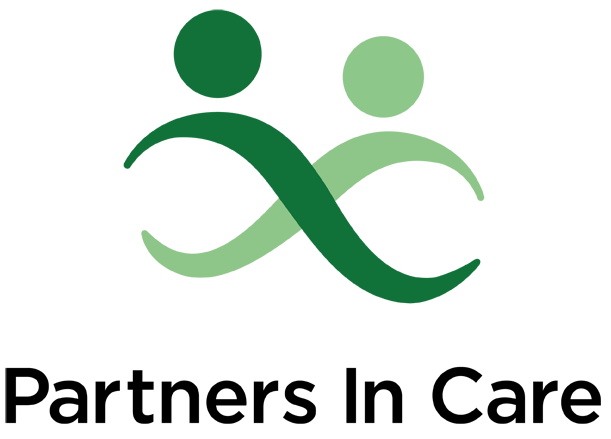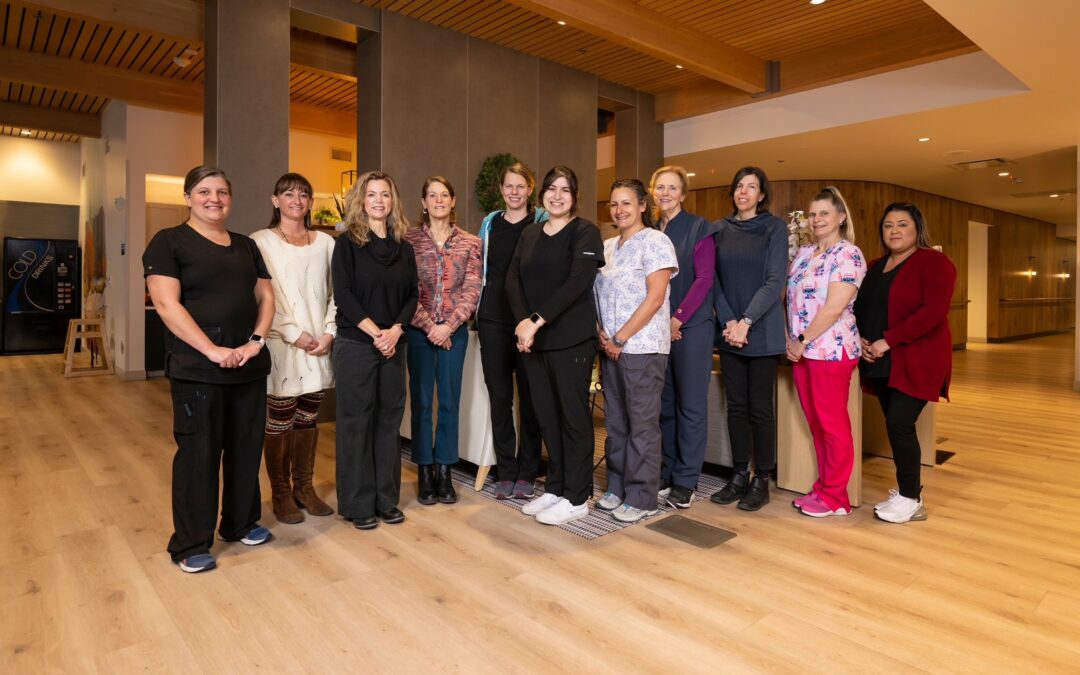This Women’s History Month, we recognize the pioneering women of the hospice movement, and celebrate the women who serve Central Oregon on the Partners In Care team.
Nearly 60 years after the first modern hospice was founded, the legacy of Dame Cicely Saunders lives on at Partners In Care. Cicely Saunders founded St. Christopher’s Hospice in southwest London in 1967 and was responsible for establishing the discipline and the culture of palliative care. She introduced effective pain management and insisted that dying people needed dignity, compassion, and respect, as well as rigorous scientific methodology in the testing of treatments.
Cicely Saunders revolutionized the way in which society cares for the ill, the dying, and the bereaved. She also understood that a dying person is more than a patient with symptoms to be controlled; she developed a “holistic” end-of-life care approach that combined excellent medical care with support for emotional, social, and spiritual needs of both the patient and family. She saw them as the whole unit of care and developed grief support services to extend support beyond the death of the patient.
The Hospice movement begins in Bend
Ruth Burleigh, who celebrates her 97th birthday this month, has lived in Bend since she was 20 years old. Burleigh was the first woman mayor of Bend in 1978 and also played a significant role in the hospice care movement in Central Oregon, serving on the initial board that helped establish the first hospice facility in Bend.
“There was a need in our community that wasn’t being met, so I worked with others to create a solution,” said Burleigh. “It started with just one nurse who would visit people in their homes. It’s humbling to see the growth, and I’m grateful to have even recently utilized [Partners In Care] services myself.”
Over 40 years later, Partners In Care has evolved and shifted from an all-volunteer force to a community based non-profit organization that still provides hospice care across Central Oregon and also offers Home Health, Palliative Care, an inpatient Hospice House, a non-medical Transitions program, as well as Bereavement support for families.
The women serving Central Oregon today
Across the nation, over 75% of healthcare workers are women; Partners In Care employs women across all six service lines, as hospice and palliative care physicians, nurses, Certified Nursing Assistants (CNA), therapists, social workers, chaplains, administrative roles, and volunteers. Each has a different story as to why they work at Partners In Care, and what they would recommend to future generations of women looking to work in the hospice and palliative care industry. Read their “why” below and learn about careers at Partners In Care.
Dr. Lisa Lewis, Partners In Care Medical Director
In doing hospice work, I honor the memories of my father, a warm and caring hematologist and oncologist, who demonstrated firsthand to me, even as a little girl, how bringing compassion to his work impacted patients and families in a profound way. I also honor the valiant efforts he and my mother made in their respective fights against aggressive cancers when effective treatments were limited. Their strong love for each other, and for my sister and me, sustained us both in the years after their early deaths. The memories of their lives and struggles, and those of the many hospice patients I have treated during my medical career, keep me inspired, engaged, and focused on making one of life’s most difficult journeys just a little bit easier for others.
My best piece of advice to younger women entering medicine, or early in their careers, is to remember the backstory of the “why” that brings them to the profession of medicine, in whatever specialty they choose. Keeping that important touchstone in mind, even on the more challenging of days, should prove to make the journey more meaningful.
Dr. Jennifer Blechman, Palliative Care Medical Director
I worked as a family doctor for 11 years, where I loved getting to know patients and often their families over time. I supported them to live the best they could by focusing on preventive care and lifestyle choices to enhance their health. However, I felt my training did not equip me to be able to support my hospice patients the way I wanted as they dealt with serious illness and end of life. I had several experiences with my patients, as well as my time covering Hospice House and working with hospice nurses, that motivated me to change careers, and I was lucky enough to complete a palliative care and hospice fellowship 11 years ago. I now work full time as a hospice and palliative care doctor and feel so lucky to be doing this work. My job is incredibly rewarding – we don’t change one’s ultimate outcome, but we can make every situation we encounter better by expertly treating symptoms, supporting people to make the choices about their medical care that are right for them and ensure they get the best care possible, and educating families on what to expect. We walk into people’s lives at such an intense, intimate time which is an incredible privilege. Both palliative care and hospice focus on patients and their families and address physical, emotional, and spiritual suffering – often not a part of our traditional medical care but critical to ensuring that patients live as fully as possible until their end.
I love my work and strongly recommend a career in healthcare. My advice is to follow your heart; for some, the training may be daunting, but the reward is great. As healthcare providers we impact many people and can support people to live their best lives on their terms. We spend a lot of our time in our jobs – find something that brings you meaning, challenge, and incredible satisfaction.
Arelly Bradley, Home Health RN and Spanish Interpreter
In my role as a home health nurse, I bring the nursing services and support of Partners In Care to patients in the comfort of their homes. I feel this is immensely important to many patients who respond to treatment much better when they can be in a home, surrounded by loved ones, and in an environment that is familiar to them. Here in Central Oregon, we serve a myriad of populations from La Pine to Madras, and Prineville to Christmas Valley, and sometimes I support families who only speak Spanish in their homes. Through my role as a medical interpreter, I help bridge the healthcare gap for Spanish speaking patients who at times are unable to advocate for their health due to the language barrier.
I would advise future generations of women to serve with compassion, stay curious, embrace challenges, and see this service as a privilege. Even when times are difficult and you’re tired and feel over-worked, remember that it is a special calling that not everyone can fulfill, and you have the chance to make an impact on someone’s life.
Jenni Carver Ross, RN, Hospice House Manager
I am fortunate to work alongside the most amazing humans providing compassionate, life-affirming care through one of life’s transitions we will all experience. It is a privilege to be part of a team and organization that supports our Central Oregon community in a profound way.
Finding a career where you have a “work family” and a position that continually challenges you to grow in your humanity is worth far more than a six-figure salary!
Pam McConnell, Transitions Coordinator
As a Transitions Coordinator, I have the honor of supporting people who don’t know where to turn or what resources they need. It’s rewarding to help people through these changing situations in life. I’m inspired by the wisdom, humor, and courage of the people I serve and work with every day.
Always remember to keep a sense of humor, get the facts, and most days you will walk away with more than you gave!
Carla Parusa, Bereavement Counselor
When I first connect with a grieving person after the death of their loved one, they are usually in so much emotional pain that they seem to believe they are going to have to feel this way forever, and the thought of that is just unbearable for them. As we begin to talk and I ask them to tell me about their spouse, their child, their parent, their friend, they begin to brighten up as they remember and share great memories and experiences. They may begin to tell their story with tears but as they share, they will smile and laugh and their eyes light up. I believe that they begin to see that there is still more here than the pain and sorrow. Likewise, when people begin the eight-week support groups, many are unable to even speak about their loss without crying and having to stop, but by the fifth or sixth session of the grief support group they are again smiling and sharing with other group members and even connecting outside of the group to have conversations over coffee. The process is miraculous! It is my privilege to witness and share this journey of healing and renewal with them. I never tire of watching the transformation. Over the years, many of my clients have reconnected with me to just share that they have truly found happiness in their lives once more. My ‘why’ is the wonderful people that I encounter, they are all just incredible.
I think it’s important to explore many different paths. While I was going to school and in the early years after graduation, I tried working in every area of mental health that I could, from working in a private psychiatric hospital with the seriously mentally ill, to marriage counseling, addiction counseling, working with foster kids in the system, and even teaching at a college. I came upon the work of my heart accidentally when I volunteered to facilitate grief support groups for hospice about 20 years ago. I fell in love with the work from the very beginning, and I love it just as much if not more today. The work is so fulfilling in so many ways. My best advice would be to stay open and flexible because you just might find your dream in the most unexpected place.
Learn more about the Partners In Care team at www.partnersbend.org

